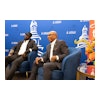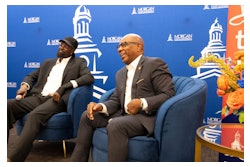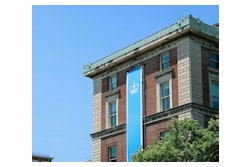The Ford Foundation’s International Fellowships Program (IFP) is winding down after 10 years of providing graduate fellowships to underrepresented students from Africa, Asia and Latin America. The foundation has worked with more than 4,300 students from 22 countries, churning out an impressive fellowship completion rate of 98 percent and a graduation rate of 91 percent at some of the best universities in the world. The Hechinger Report spoke with IFP Executive Director Joan Dassin to get her thoughts on the program’s successes and what others can learn from the program
Q. You try to get people in particular who have had a lot of obstacles to higher education. What are some of those obstacles?
A. The fellowships are directed to people who otherwise would not have an opportunity for higher education at the graduate level and particularly international study. Who is included and who is excluded from higher education very much depends on the particular context of the individual country. … Poverty is a baseline, but it’s not the only requirement. We look for other indicators of exclusion. Rural dwellers very often are people who don’t have educational opportunities—women in some contexts but not all, members of marginalized ethnic groups, racial and ethnic minorities, people living with disabilities is often a category that is quite overlooked but people who very typically have great difficulty in accessing higher education.
Q. These must be tough groups to recruit. How do you go about trying to reach out to these people and make sure they can apply and are prepared when they get to the university?
A. We have had an extremely decentralized recruiting effort. We work with what we call partner organizations, local organizations based in the countries that themselves then galvanize networks of institutions, organizations, NGOs, government agencies, their own academic contacts, people from social movements. And over time they’ve been able to build up networks that take them out of the capital cities and more into the regions where these people live and work. And, as time went on, of course, our own alumni serve as wonderful recruiters for subsequent generations of fellows.
In terms of preparation, we recognize that, just as educational advantage is compounded, educational disadvantage also is compounded. What we find is that many of our fellows come to the program with real gaps in their previous education, so we provide up to a year of what we call “pre-academic training,” which is a skills-based training program all designed and administered by local providers, local universities, independent organizations—increasingly, online kinds of courses in everything from English and computer skills, research methodology, academic writing in one’s own language, and so on. In addition to that, about a third of our fellows receive some kind of transitional training at their host universities, often an intensive English course or courses that have been specially designed for these kinds of people with gaps in their backgrounds before they actually undertake their graduate programs or while they’re transitioning into them. Increasingly, I think universities are recognizing that, if they do want to serve a different kind of constituency or new publics, they have to meet those students where they are rather than expecting them to necessarily compete on equal terms with people who’ve had the advantage of highly sophisticated undergraduate education.
Q. Eighty percent of your fellows returned to their home countries or are living in their home countries right now. Some developing countries are having problems where a lot of students want to go study in the Western world and just never come back. Why do you have such a high return rate?
A. It goes back for us to the question of selection criteria. Rather than thinking about whether or not people will return to their home countries at the end of the program, we think about it at the beginning. In addition to academic achievement and credentials, we also look very closely at two other sets of attributes—one having to do with social commitment to their home communities. We’re looking for evidence of that—how are people connected to their home communities? We look to see what a person has actually done. Have they founded organizations? Have they been in leadership positions in those organizations? Have they worked in key government posts? The fact that they are engaged prior to the fellowship—while it’s not a determinative kind of an indicator—it gives us some idea that they’ll continue to be engaged as they return. Another pillar of our selection process has to do with leadership. Most of our fellows are older. They’re not straight out of an undergraduate program. The average age is somewhere in their mid-30s. The kind of proposal they make for their studies is ‘what issue do you want to work on and why is it important for development in your home country?’
The other set of mechanisms that we have in the program, because each country’s program is administered by a local organization in their home country in their home language, every time they send a transcript or request a renewal of their fellowship—all of that has to go through their home country. It doesn’t come to New York. As a result, they are connected continuously to their home country. That provides a form of accountability that keeps people much more tightly tethered to their country of origin than a typical program where you’re given a ticket and people say, ‘Goodbye and good luck to you and come back when you’re done.’
Q. What are some lessons we can learn about international education from this program?
A. It is possible to find the kind of emerging leaders from marginalized communities in developing countries [and] provide them with adequate support so that they do extremely well in highly competitive settings. That’s a terribly important lesson because the argument against expanding access is you’re going to lower quality, lower standards. What we have discovered—and we can prove it empirically now on a very large base—is that these degrees that our fellows are earning are not second-class degrees. These are the best universities in the world. Our students are highly competitive and they are able to perform academically. But you know a certain amount of preparation has to go along with that.
Other fellowship programs and universities in general should be very attuned to a different kind of student and think about excellence as we do in a broader way. It’s not simply about academic achievement; it’s about academic potential as it is connected to these other deeper issues about commitment to one’s own country, and so on. Quality standards do not have to suffer if you broaden access.


















